Grease on kitchen cabinets is a common problem caused by airborne fats from cooking. Using citrus-based cleaners offers a safe, effective option to break down and lift stubborn grease naturally. These cleaners contain natural acids and citrus oils that dissolve grime without harsh chemicals. To keep your cabinets spotless and avoid damage, choose the right citrus cleaner and follow proper application tips. To discover simple recipes and preventative tips, keep exploring how citrus cleaners can help maintain your kitchen’s shine.
Key Takeaways
- Citrus-based cleaners effectively dissolve grease while leaving a fresh scent and are environmentally safe for kitchen cabinets.
- Regular cleaning with citrus cleaners prevents stubborn grease buildup and maintains cabinet appearance.
- Removing hardware and testing citrus solutions on hidden areas helps avoid surface damage.
- Combining citrus oil with vinegar or baking soda enhances grease removal and eco-friendly cleaning.
- Maintaining good ventilation reduces airborne fats and oils, decreasing grease accumulation on cabinets.
Understanding Why Kitchen Cabinets Accumulate Grease
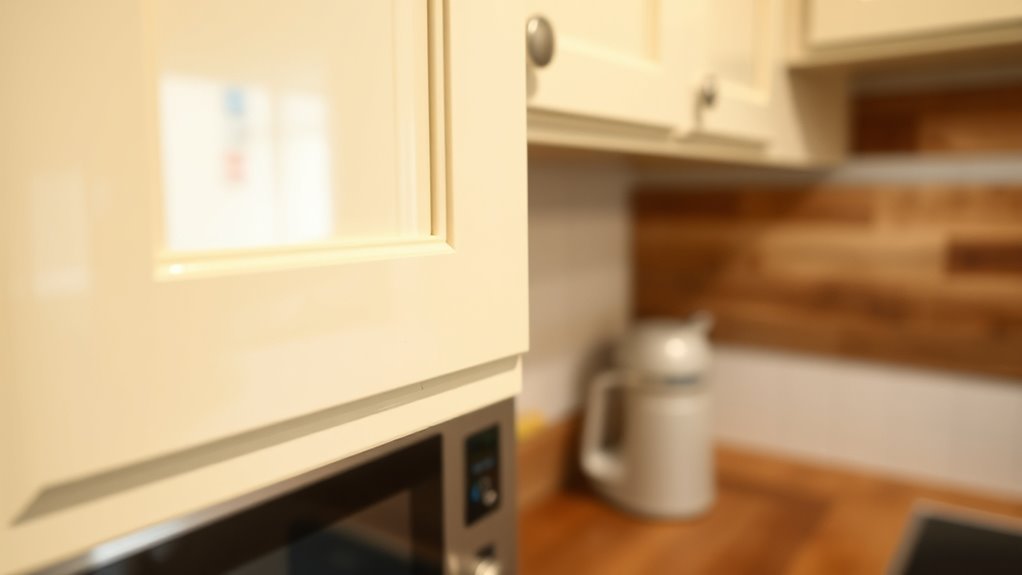
Kitchen cabinets often accumulate grease because cooking produces airborne fats and oils that cling to surfaces. The type of cabinet material influences how easily grease buildup occurs. For example, wood may absorb some oils, making it harder to clean, while laminate surfaces tend to resist grease better. When you cook, steam and fumes carry tiny oil particles into the air, which then settle on your cabinets. Over time, these particles accumulate, forming a greasy film that’s difficult to remove if left untouched. This buildup not only dulls the appearance of your cabinets but can also attract more dirt and grime. Understanding how your cabinet material reacts to grease helps you choose the right cleaning approach and prevent stubborn buildup before it becomes a problem. Additionally, knowing the airborne fats and oils generated during cooking can guide you in implementing effective cleaning routines to maintain your cabinets’ appearance.
Benefits of Using Citrus-Based Cleaners
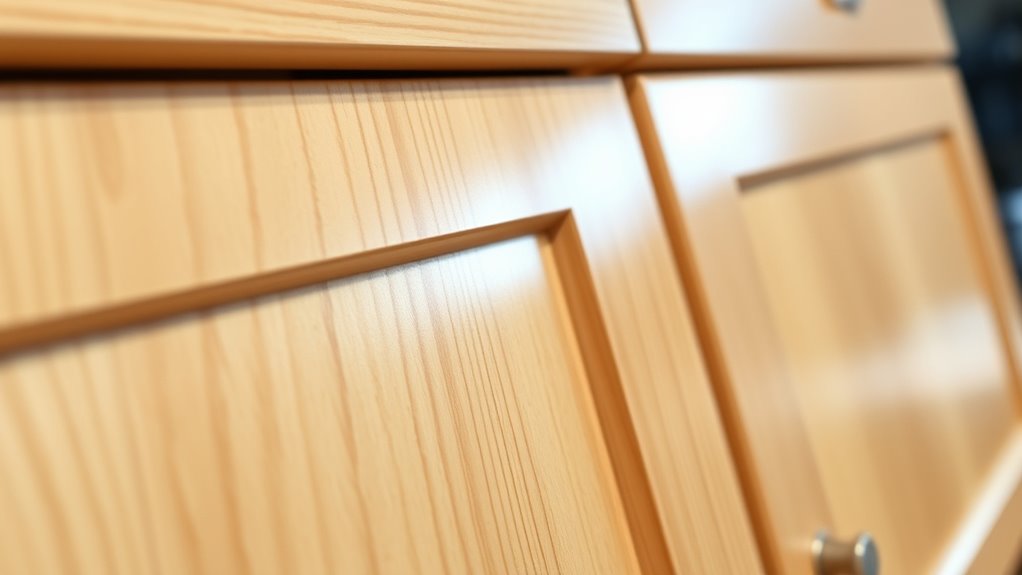
Using citrus-based cleaners offers a natural and effective way to combat grease buildup on cabinets. The citrus peel contains natural acids that break down grease without harsh chemicals. These acids dissolve stubborn grime while leaving a fresh, clean scent. Unlike synthetic cleaners, citrus-based solutions are environmentally friendly and safe for your family. They also reduce exposure to toxic fumes often found in commercial degreasers. Plus, citrus peels are a renewable resource, making these cleaners sustainable. Applying a citrus-based cleaner is simple: the natural acids work quickly to loosen grease, making wipe-up easier. This approach not only keeps your cabinets spotless but also preserves the integrity of your surfaces. Overall, citrus-based cleaners combine power and safety, making them an excellent choice for your kitchen. Using natural cleaning methods can also help reduce chemical exposure in your home.
Common Natural Ingredients in Citrus-Safe Cleaning Solutions
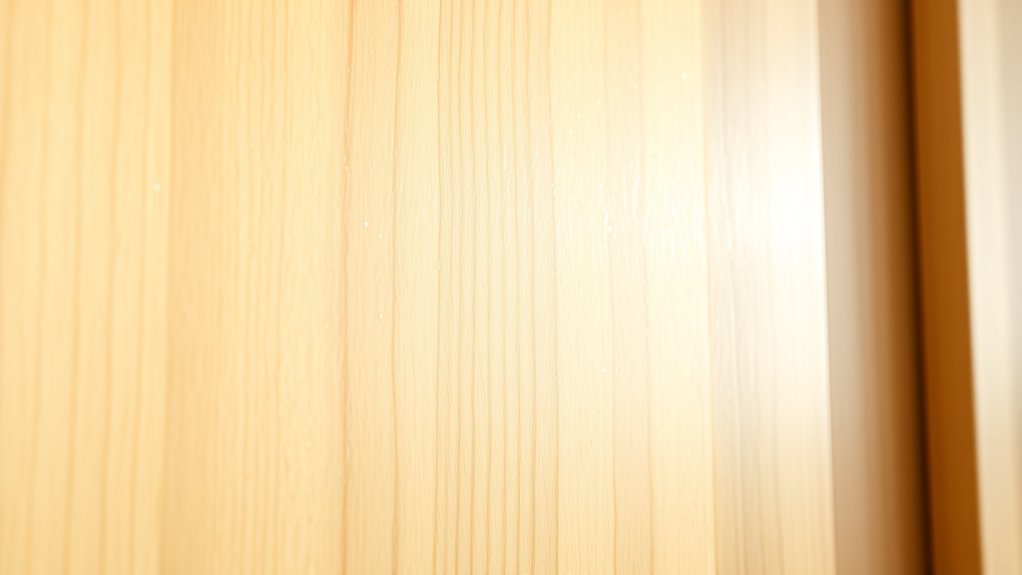
Have you ever wondered what natural ingredients make citrus-safe cleaning solutions effective? The key ingredient is citrus oil, which acts as a powerful natural degreaser. Extracted from citrus peels, this oil contains compounds like limonene that break down stubborn grease and grime. Along with citrus oil, these solutions often include other plant-based ingredients such as vinegar, baking soda, or essential oils, enhancing their cleaning power without harmful chemicals. Citrus oil not only dissolves grease but also leaves a fresh, clean scent. These natural ingredients work together to create an effective, eco-friendly cleaner that’s safe for your kitchen cabinets and the environment. Using citrus-based solutions means you’re leveraging natural degreasing properties without sacrificing safety or effectiveness.
Step-By-Step Guide to Removing Grease With Citrus Cleaners
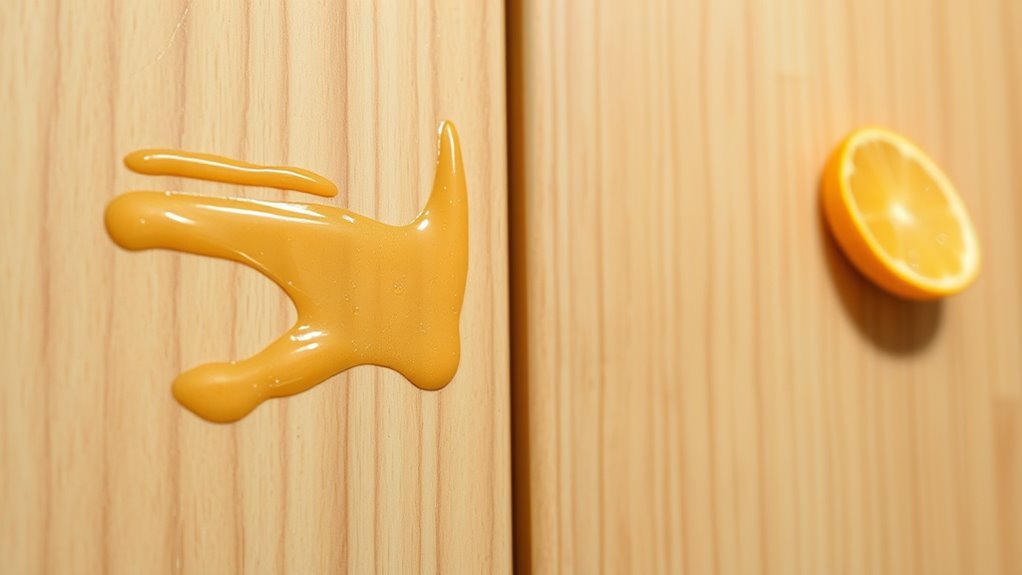
Removing grease from your cabinets with citrus cleaners is simple if you follow a few straightforward steps. First, clear your kitchen lighting area and remove cabinet hardware for thorough cleaning. Next, spray the citrus cleaner onto greasy surfaces, focusing on areas with buildup. Let it sit for two to three minutes to break down grease. Use a soft cloth or sponge to wipe the cabinets, paying attention to corners and edges. For stubborn spots, reapply the cleaner and scrub gently. Finally, dry with a microfiber cloth to prevent streaks.
| Step | Action |
|---|---|
| Preparation | Remove hardware and clear lighting area |
| Application | Spray citrus cleaner |
| Waiting | Let sit for 2-3 minutes |
| Final Cleaning | Wipe and dry with a microfiber cloth |
Tips for Choosing the Right Citrus Cleaner for Your Cabinets
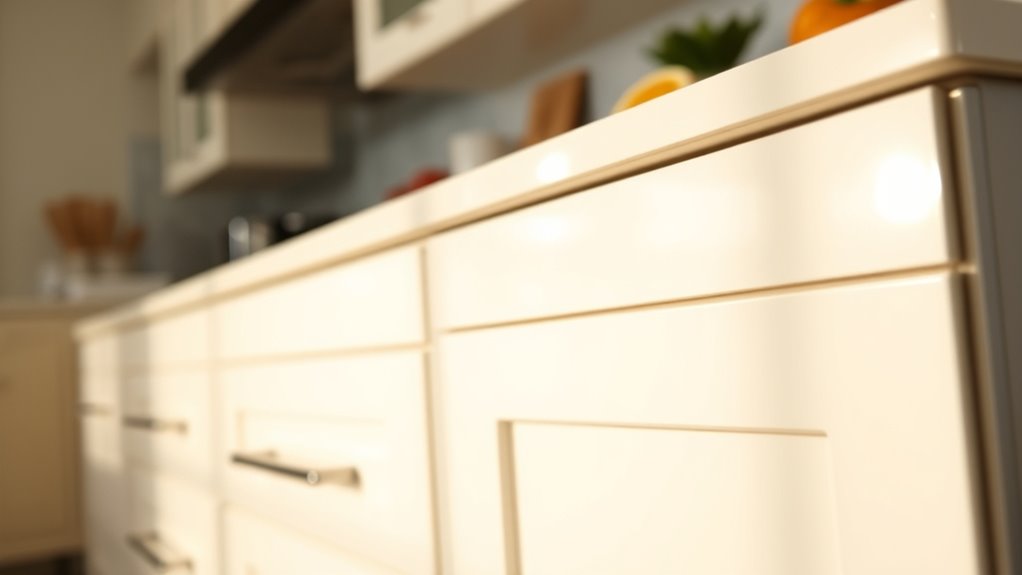
Choosing the right citrus cleaner can make a significant difference in how effectively you remove grease from your cabinets. When selecting a cleaner, focus on choosing natural ingredients, as they’re safer for your family and better for the environment. Look for products that specify natural citrus extracts like lemon or orange oil, which cut through grease without harsh chemicals. It’s also helpful to do a commercial product comparison—check reviews, ingredient lists, and certifications to find a reliable, plant-based option. Avoid cleaners with artificial fragrances or synthetic solvents that can harm your cabinet finish. By prioritizing natural ingredients and comparing options carefully, you’ll ensure your cabinets stay clean, safe, and beautifully maintained with a citrus cleaner suited to your needs. Additionally, understanding the personality traits of effective cleaning habits can motivate you to maintain a consistent cleaning routine.
DIY Recipes for Making Your Own Citrus Degreaser
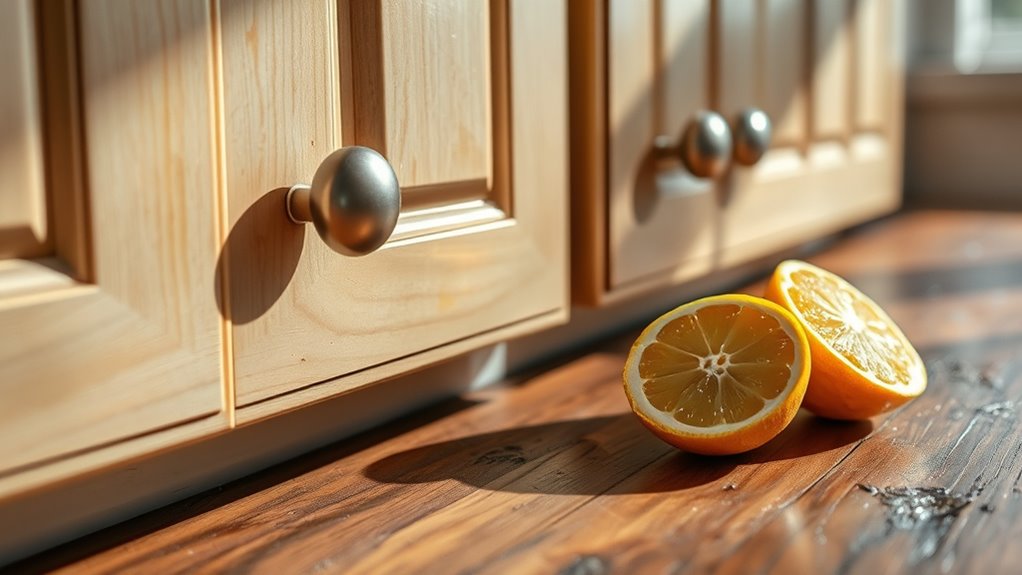
Creating your own citrus degreaser at home is simple and cost-effective. By combining natural degreaser ingredients, you can harness the citrus oil benefits for a powerful, eco-friendly clean. Here’s a quick recipe to get you started:
- Fill a spray bottle with 1 cup of water.
- Add ½ cup of white vinegar.
- Mix in 10-15 drops of citrus oil (like lemon or orange).
- Shake well before each use.
Citrus oils contain natural acids that cut through grease and grime while leaving a fresh scent. These natural degreaser ingredients are safe for your kitchen, effective against stubborn grease, and free from harsh chemicals. Making your own citrus degreaser gives you a cost-effective, safe alternative that keeps your cabinets looking spotless.
Preventative Measures to Keep Grease at Bay
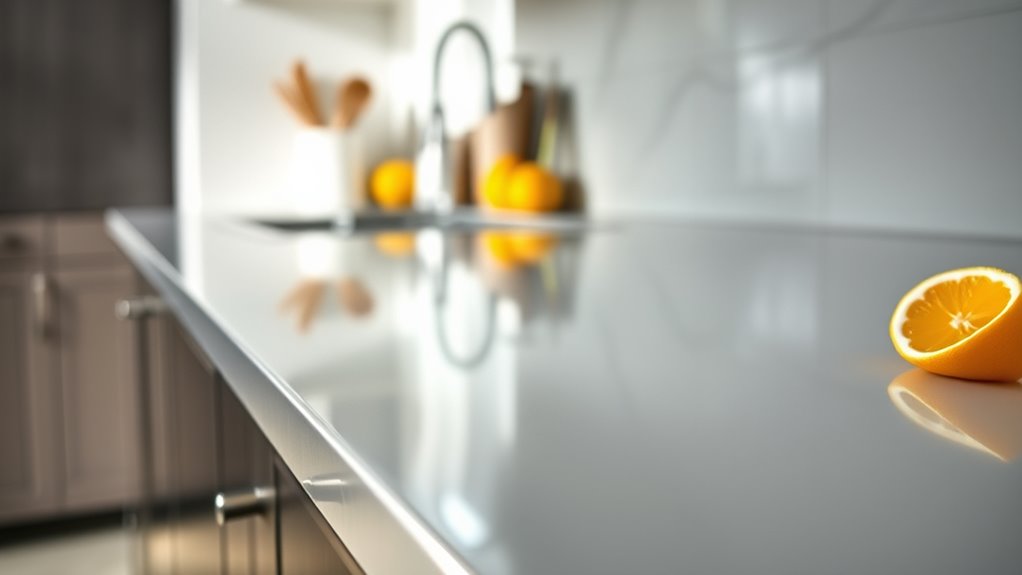
Keeping grease off your cabinets starts with regular cleaning to remove buildup before it becomes a problem. Applying protective coatings can create a barrier that makes future messes easier to clean. By staying consistent with these measures, you can maintain a spotless, grease-free kitchen. Regular use of a paint sprayer can help apply sealants evenly and efficiently on cabinet surfaces.
Regular Kitchen Cleaning
Regular kitchen cleaning is essential for preventing grease buildup on your cabinets. Consistent upkeep keeps your kitchen looking fresh and protects your décor. To effectively maintain your cabinets, consider these steps:
- Wipe down surfaces daily with a soft cloth to remove dust and splatters.
- Use gentle, citrus-based cleaners suitable for your cabinet materials to cut grease without damage.
- Clean kitchen appliances and range hoods regularly to minimize airborne grease settling on cabinets.
- Organize your kitchen to reduce clutter, making cleaning easier and more efficient.
Use of Protective Coatings
Applying protective coatings to your kitchen cabinets is one of the most effective ways to prevent grease from sticking and accumulating over time. These protective coatings, often clear or semi-transparent, create a barrier that repels oils and dirt. Using high-quality kitchen finishes ensures your cabinets resist stains and are easier to clean. When you choose durable protective coatings, you reduce the need for frequent scrubbing and harsh chemicals. Applying these finishes correctly enhances the longevity of your cabinets and maintains their appearance. Regularly reapplying or touch-up of protective coatings can keep grease at bay, especially in high-traffic or cooking-heavy areas. By investing in proper kitchen finishes, you’re proactively safeguarding your cabinets and simplifying your cleaning routine. Additionally, selecting finishes with long-lasting durability can further improve the resistance to grease and stains over time.
Safety Tips When Using Citrus Cleaners
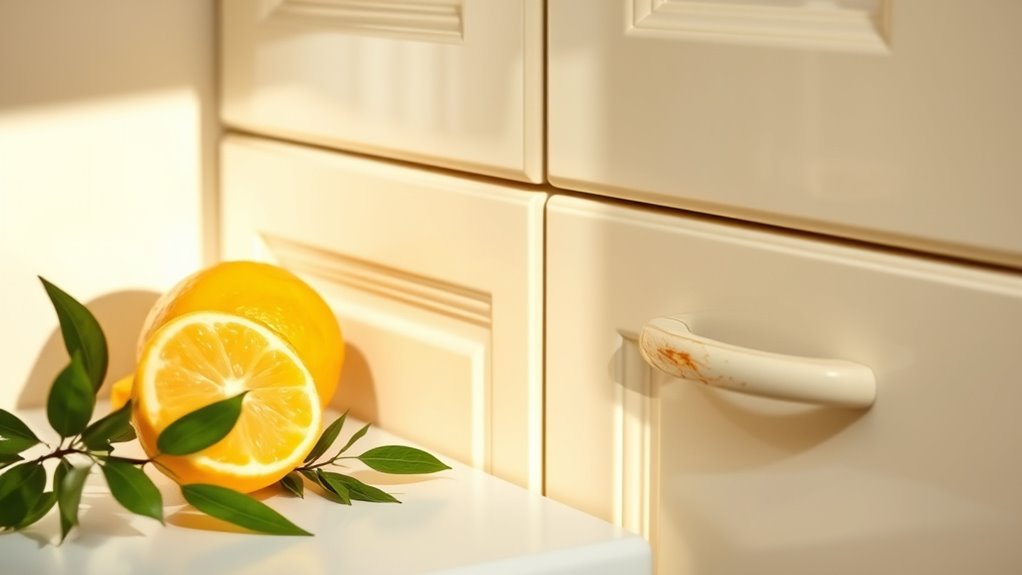
When using citrus cleaners, make certain your area is well-ventilated to avoid inhaling fumes. Always test the cleaner on a small, hidden spot first to prevent damage or discoloration. Use gentle, even application to protect your cabinets and ensure effective cleaning.
Proper Ventilation Needed
Since citrus cleaners contain strong natural acids, ensuring proper ventilation is essential to prevent inhaling fumes that can irritate your respiratory system. Good airflow helps maintain air quality and reduces lingering odors. To maximize safety, consider these steps:
- Open windows and doors to create cross-ventilation.
- Turn on exhaust fans or range hoods during and after cleaning.
- Use a dehumidifier to control humidity, preventing mold and mildew.
- Keep fresh air circulating to avoid buildup of fumes.
- Be aware that Hydrotherapy techniques like warm water and aquatic exercises can also promote relaxation and recovery in your kitchen or home environment.
Proper ventilation not only protects your lungs but also maintains ideal humidity control, which can prevent cabinet warping or damage caused by excess moisture. Prioritizing fresh air helps you clean effectively while keeping your kitchen space safe and comfortable.
Test on Small Area
Before using citrus cleaners on your kitchen cabinets, it’s important to test a small, inconspicuous area first. This helps you assess how the cleaning solution interacts with your cabinet’s surface. Begin by applying a small amount of the cleaner to a hidden spot, such as the inside corner or underside of a door. Watch for any signs of a testing surface, especially color change, which could indicate damage or discoloration. If the color remains unchanged after a few minutes, it’s safe to proceed with cleaning the rest of your cabinets. If you notice any fading, staining, or other alterations, avoid using the citrus cleaner on visible areas. Taking this step ensures your cabinets stay beautiful and undamaged during your cleaning process. Additionally, understanding the industry transformations related to cleaning products can help you choose safer and more effective options.
Use Gentle Application
To guarantee safe and effective cleaning, always apply citrus cleaners delicately. Different cabinet materials react differently—wood, laminate, or painted surfaces—so handle each with care. When tackling grease types, recognize that greasy buildup varies in density, requiring tailored approaches. To avoid damage, follow these tips:
- Use a soft cloth or sponge to prevent scratches.
- Apply the cleaner in small, controlled amounts.
- Avoid excessive scrubbing, especially on delicate finishes.
- Test on a hidden area first to check for discoloration or damage.
- Be mindful of cultural impacts on artistic expression, as technology influences creative practices and material choices.
Being gentle ensures you don’t strip finishes or cause warping, especially on sensitive cabinet materials. Proper application preserves your cabinets’ appearance and extends their lifespan while effectively removing grease.
Maintaining Your Cabinets for Long-Term Cleanliness
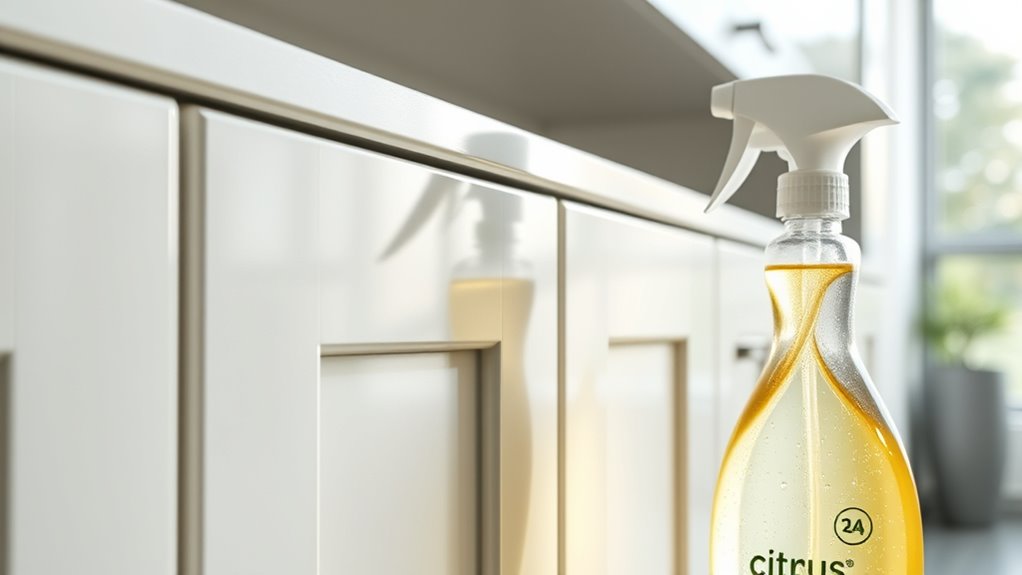
Regularly inspecting and cleaning your kitchen cabinets is essential for maintaining their long-term cleanliness. Start by checking cabinet hardware for dust, grease buildup, or loose screws, and clean or tighten as needed. Good kitchen ventilation helps reduce grease and moisture that can settle on surfaces, making upkeep easier. Wipe down cabinet exteriors with a citrus-based cleaner to cut through grease and prevent buildup. Don’t forget to clean around handles and hinges, which can trap grime. Regular maintenance prevents dirt from settling deeply, saving you time and effort later. Keeping the area well-ventilated also slows down the accumulation of grease. Practicing vertical storage solutions can help organize your space more efficiently and make cleaning easier. By staying consistent with these habits, your cabinets stay fresh, shiny, and free of stubborn grease, ensuring they look great for years to come.
Frequently Asked Questions
Can Citrus Cleaners Damage Painted or Stained Cabinet Surfaces?
Citrus cleaners can potentially damage painted or stained cabinet surfaces if used improperly. They may break down certain paint finishes or weaken stain integrity over time, especially with frequent use. To protect your cabinets, always dilute citrus cleaners according to instructions and test in a small, inconspicuous area first. Using gentle, residue-free cleaners helps maintain your cabinets’ finish and stain quality, ensuring they stay beautiful longer.
How Often Should I Deep Clean Kitchen Cabinets With Citrus Solutions?
You should deep clean your kitchen cabinets with citrus solutions every three to six months to maintain their cabinet durability and citrus freshness. Regular cleaning prevents grease buildup and keeps surfaces looking new. Using a gentle citrus cleaner guarantees you preserve paint or stain integrity while benefiting from the natural fresh scent. Consistent cleaning not only maintains the cabinets’ appearance but also enhances their longevity, keeping your kitchen smelling fresh and vibrant.
Are Citrus-Based Cleaners Effective Against Stubborn Grease Stains?
Your kitchen’s grease stains won’t stand a chance against citrus-based cleaners—they’re like a superhero fighting stubborn grime! Citrus cleaners excel in natural degreasing and acidic cleaning, breaking down tough grease without harsh chemicals. Their powerful acidity dissolves stubborn stains effectively, leaving your cabinets fresh and spotless. For best results, use them regularly to prevent buildup and enjoy a cleaner, healthier kitchen environment.
Do Citrus Cleaners Have a Strong Scent, and Is It Safe for Pets?
Citrus cleaners often have a strong citrus scent that some might find invigorating, but others may find overpowering. Luckily, many citrus-based products are formulated to be safe for pets when used as directed, so you can clean your kitchen cabinets without worrying about harming your furry friends. Always check the label for pet safety information and guarantee proper ventilation to enjoy the fresh citrus scent safely.
Can Citrus Cleaners Be Used on Other Kitchen Appliances Safely?
Using citrus cleaner on your kitchen appliances is like giving them a invigorating spa treatment—it’s generally safe when you consider citrus cleaner compatibility and kitchen appliance safety. You should always check the manufacturer’s instructions, but most citrus-based solutions work well on stainless steel, glass, and plastic surfaces. Just avoid prolonged contact with sensitive electronics, and you’ll keep your appliances spotless and smelling crisp without risking damage.
Conclusion
With citrus cleaners acting as your kitchen’s fresh breath of spring, you can keep grease at bay effortlessly. Think of them as a natural shield that not only cleans but also brightens your cabinets. By choosing the right citrus solution and sticking to simple preventative habits, you’re planting seeds for a spotless, gleaming kitchen that stays inviting. Embrace these natural tools, and watch your cabinets shine like a beacon of cleanliness in your home.









